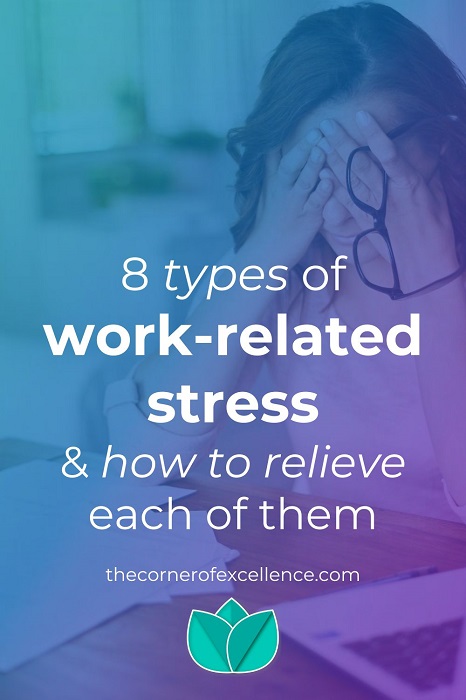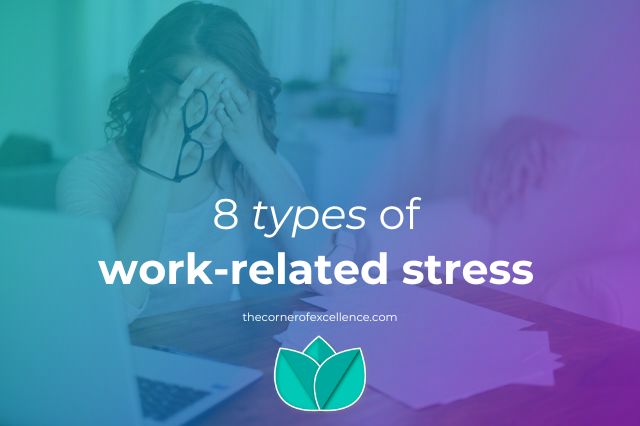Depending on our work situation and other factors, we can be affected by different types of work-related stress. Our way of being, our education and experiences influence how we cope with our environment and what happens.
That is why, depending on our circumstances, we can get stressed about some things or others. Let us look at the causes and effects of work-related stress as well as eight types of work-related stress and how to deal with them.
Causes of work-related stress
We each have our baggage and our circumstances. Due to our background we perceive our situation in a certain way. Therefore, the types of work-related stress that we can experience depend on all these factors:
- Type of job
- Level of responsibility
- Volume of tasks and projects
- Typology of tasks
- Clarity of priorities and objectives
- Own Management and leadership style and that of our bosses
- Work environment
- Personality
- Education received
- Experiences and resources in the form of technical and personal skills
- Incongruence with your values and priorities
- Perception
In short, what type of work-related stress we suffer depends on our personal and professional situation. On the one hand our environment affects us. On the other hand, we are influenced by how we perceive our environment. That means, how prepared we feel to face the circumstances and the different challenges.
Effects of stress
A small portion of stress puts us on alert and into action. But if stress is prolonged in time it is detrimental to health. It affects us on physical, mental, emotional and behavioural level. That is why it is important to look for the causes and counteract them.
Burnout syndrome
The accumulation of stress, tension and overexertion can lead to the burnout syndrome. We notice a physical and mental exhaustion. We constantly feel lacking in energy and interest. That is why our performance drops.
Boreout syndrome
Symptoms of the boreout syndrome are similar to burnout. Constant fatigue, reduced performance and ability to concentrate can be noted. However, the boreout is due to a lack of demand at work or disinterest in the job. It can be due to repetitive and monotonous work or directly the lack of tasks.

Types of work-related stress and how to deal with them
To avoid reaching the point of burnout or boreout, let us look at the different types of work-related stress that you can suffer.
1. Stress due to overload
This type of work-related stress is characterised by a feeling of overwhelm by obligations, responsibilities and tasks. We feel like we have more work than we can handle. It seems to us that no matter how hard we work, we do not advance.
We can also feel stress due to overload when assigned tasks exceed our knowledge and skills.
All of this can lead to tension, anxiety, mental block, and even panic attacks.
When we suffer stress due to overload, it is convenient to stop and reflect on our priorities, the tasks to tackle and our ability to carry them out.
>> Deal with stress due to overload
2. Stress due to a burden of responsibility
This type of stress is related to the previous one. Due to our position in a company or our family responsibilities we feel overwhelmed. Perhaps a mistake in our job can have serious consequences. Maybe we feel under pressure to meet certain goals and run a business. Or it may also be that we are the only source of income for a family.
Due to all this, we feel that we carry the weight of the world on our shoulders. We spend our days running like a headless chicken trying to do everything we think we should. But still we have the feeling of not accomplishing everything.
When we suffer stress due to a burden of responsibility, it is convenient to review our responsibilities and obligations. Do you really have to do everything you are doing? How is your balance between professional and personal life, between work and fun?
>> Deal with stress due to a burden of responsibility
3. Stress due to a sense of powerlessness
This type of work-related stress is due to the feeling of not being able to influence certain things. We feel that we have no control or power over the situation. Perfectionists are more likely to suffer from this type of stress. But also people who believe that they need to control every detail of their life.
It is common to feel nervous and impatient. If stress worsens, we can even suffer anxiety or panic attacks.
To overcome stress due to a feeling of powerlessness, it is convenient to review our attitude. It requires first of all accepting that things are not always how we would like them to be. It is convenient to review what is in our power to improve and what is not. Then we can focus on changing what we can.
>> Deal with stress due to a sense of powerlessness

4. Stress due to a feeling of insecurity
This type of stress can manifest itself in environments of crisis and precarious employment. You may fear losing your job. Maybe your salary does not allow you to make ends meet. Or you fear that your working conditions may worsen.
When you suffer from stress due to a sense of insecurity you can feel worried, overwhelmed, irritated or pessimistic. You may not see a solution to your problems. You may even doubt your worth.
In case of suffering this type of work-related stress, it is advisable to review your situation and your attitude. Uncertainty can be stressful. But the world changes and evolves. In the same way, our employment situation can change. To feel capable of facing these challenges, we also must evolve. We need to take charge of our lives and our personal and professional development.
>> Deal with stress due to a feeling of insecurity
5. Stress due to a lack of recognition
The constant lack of recognition of our work can cause stress. Feeling that we do not add value or that we do but it is not acknowledged. Such recognition can be adequate remuneration, a monetary bonus or compensation in kind, or the appreciation of a job well done.
6. Stress due to a lack of support
Even worse can be the feeling of lack of support. We may not have clear objectives and priorities. Perhaps we do not receive guidelines. We do not get necessary information or support from our bosses or colleagues. Or as a boss we work with collaborators who do not get involved.
Lack of support or recognition can undermine our self-esteem and self-confidence. They can lead to demotivation and frustration. In the worst case, as with all types of stress, you can slip into depression.
Dealing with these two types of stress requires working on our emotional intelligence and our soft skills. Good self-confidence and self-esteem make us less vulnerable to these kinds of stress. Not isolating yourself, not taking things personal and assertiveness will be other allies.
>> Deal with stress due to a lack of support or recognition

7. Stress due to workplace harassment
Workplace harassment is lack of support and recognition taken to the extreme. It is an abuse that can be physical but is usually psychological.
Workplace harassment is characterised by strategies of isolation, intimidation, insult, contempt, threats and even violence. All this abuse obviously causes a lot of stress. Because of this, the victim of bullying tends to worsen their performance, their self-esteem and have problems in personal relationships. They may experience psychological and psychosomatic problems. This is why the victim may need help from a psychologist.
As in the previous case, taking care of our self-esteem and self-confidence as well as training our emotional intelligence make us less vulnerable to attacks. It is also key not to isolate yourself and look for allies. Our superior (if it is not the harasser) and the Human Resources department should help us resolve the situation. Sadly, the reality is that there are still many cases in which the answer leaves much to be desired.
>> What is workplace harassment and how to deal with it
8. Stress due monotony or boredom
This type of work-related stress is usually lesser known. However, monotonous and repetitive work can also cause stress. With boredom and lack of stimuli, the day can drag along.
Signs of stress due to monotony are demotivation, unwillingness, and apathy. Suffering this type of stress continuously can lead to the boreout syndrome.
Dealing with stress due to monotony or boredom involves finding meaning in our work. It also helps to find a meaning to the boring tasks and look for a way to make them more entertaining. Seeking stimuli, challenges and asking for more responsibilities are other suggestions.
>> Deal with stress due to monotony or boredom
How to deal with work-related stress
In general, when we feel stressed it is convenient to bring our mind to the present moment. To do this, activate all your senses and become aware of your surroundings. Much of the stress is due to brooding about the past or future. If we take a moment to be present, we will have a clearer head to analyse our options.
Then we should reflect on the causes of our stress. That way we can work on finding solutions to improve our situation.
Do you suffer from work-related stress?
Do you suffer from stress at work? Which of the types of stress usually affect you the most? Why? And what do you do about it?

Sharing is caring!






6 Responses
This is a very comprehensive and helpful list. There are so many different influences and this can help people to understand what is triggering there stress, thank you!
Great informational post! I think many of us may through one or more type of the work-related stress in our life time. The most important thing is to acknowledge and find ways to get over it. Thanks for the identification and tips
This is a good post, because not everyone has a stress filled job, and some people are simply not built for it. Covid has added extra stress to already high stress level jobs which have really added a whole separate level to this type of stress, and how those workers compartmentalize to survive. The best thing we do is has some empathy for those placed in those environments.
Hi Jen! As you say, this post is not only helpful for those suffering the stress but also for those surrounding them. That way they can understand better and be more empathetic.
As an essential healthcare worker, I NEEDED this post today. Thank you so much for your insight. As it turns out, I have multiple different kinds of stress!
Hi Emily! I am glad you found the post helpful. Certainly one can suffer from different types of work-related stress. And each needs to be dealt with in a certain way, as the sources are usually different.